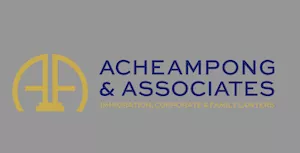AN OVERVIEW OF SOME OF THE MAJOR TAXES FOR BUSINESSES IN GHANA IS AS FOLLOWS:
Corporate Taxes:
The corporate income tax (CIT) rate for most companies in Ghana is 25%. For companies engaged in mining and for companies in the upstream oil and gas sector, the CIT rate is 35%. Companies that are mainly in the hotel and hospitality sector pay CIT at the rate of 22%. For companies engaged in the business of non-traditional exports, the CIT rate is 8%. Non-traditional exports are all exportable products, with the exception of cocoa beans, logs and lumber, mineral ore (unprocessed gold, diamond bauxite etc.), electricity, fresh fish and fresh yams.
National Fiscal Stabilization Levy and Financial Sector Recovery Levy
Banks that lend to businesses in the agricultural and leasing sectors pay a CIT rate of 20% on income from those sectors. In addition to corporate taxes, certain companies in specific sectors are required to pay additional levies, namely the National Fiscal Stabilization Levy (NFSL) and the Financial Sector Recovery Levy (FSRL). The NFSL applies to specific companies to raise money for the fiscal stabilization of the Ghanaian economy. These companies include insurance companies, Telecommunications companies and Banks. The rate for the NFSL is 5% on the profit before tax of these companies. The FSRL is only applicable to commercial banks. The rate for the FSRL is 5% of the profit before tax of the banks.
Value-added tax (VAT)
Apart from exempt goods, VAT is supposed to be charged on the importation of goods and the supply of goods and services made in Ghana. The rate for VAT in Ghana is 15%. For supplies of a retailer of goods, however, the VAT is taxed at a flat rate of 3%.
YOU MAY ALSO BE ENTITILED TO TAX HOLIDAYS AND REBATES DEPENDING ON THE SECTOR YOU ARE DOING BUSINESS IN
Free zone enterprises
If you are a company registered to operate as a free zones enterprise, you will not be required to pay Corporate Income Tax for the first ten (10) years of operation. After the ten-year corporate tax holiday expires, you will be taxed at a rate of 15% for exports outside Ghana, and you will be taxed at a rate of 25% for income earned from sales in the Ghanaian market.
Tax holidays for certain businesses
If you are engaged in any of the following businesses, you will be required to pay only 1% tax during the tax holiday period. Please see below a table describing these businesses:
| No. | BUSINESS | NUMBER OF YEARS FOR TAX HOLIDAY | TAX RATE AFTER EXPIRATION OF TAX HOLIDAY |
| 1. | Cattle farming | 10 | 25% |
| 2. | Tree crop farming | 10 | 25% |
| 3. | Waste processing | 7 | 25% |
| 4. | Agro-processing conducted wholly in Ghana | 5 | 25% |
| 5. | Cash crops or livestock (excluding cattle) | 5 | 25% |
| 6. | Production of Cocoa by-products which are wholly produced in Ghana | 5 | 25% |
| 7. | Construction of low-cost housing | 5 | 25% |
Locational Incentives (Tax Rebates)
- You will be entitled to certain tax rebates depending on which part of Ghana your business is located in:
- For businesses engaged in manufacturing, you will pay a CIT rate of 25% if your business is located in Accra and Tema.
- If your manufacturing business is located in all other regional capitals of Ghana, you will pay a CIT rate of 18.75%.
- If your manufacturing business is located outside any regional capital in Ghana, with the exception of Tema, you will pay a CIT rate of 12.50%.
- If you are engaged in agro-processing, you will be entitled to an additional tax rebate after the expiration of your 5-year tax holiday if your business uses local agricultural raw materials as its primary input:
- 20% CIT if the agro-processing business is located in Accra or Tema
- 10% CIT if the agro-processing business is located in other regional capitals with the exception of the Northern, Upper East and Upper West Regional Capitals)
- You will not be required to pay CIT if your agro-processing business is located outside any Regional Capital in Ghana except Tema. You will also not be required to pay CIT if the business is located in the Regional Capitals of the Northern, Upper East and Upper West Regions of Ghana.
The content of this article is intended to provide a general guide to the subject matter. Specialist advice should be sought about your specific circumstances.

